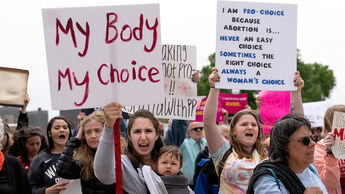
When those with pro-choice beliefs are intellectually honest, a real conversation about abortion can begin, says CARE's Naomi Marsden.
Over the weekend a fascinating Twitter exchange about abortion took place between journalist Peter Hitchens and Ann Furedi, Chief Executive of BPAS.
At one point in the debate, Furedi revealed a stance that, as the CEO of one of Britain’s largest abortion providers, might seem somewhat surprising:
“I place great value on the life of an unborn child, but not as much as I place on that of the woman. For me the humanness of human life is more than DNA, it’s our moral self and agency. Strip a woman of that so fundamentally and you strip away her humanity.”
The incredulous nature of Furedi’s statement does not derive from her view of the hierarchical relationship of woman and baby, but from the fact that she actually recognises the ‘value of the life of an unborn child’. Even using the term ‘unborn child’ is anathema to many in the pro-choice movement.
Of course, anyone familiar with Furedi’s views, as set out in her book ‘The Moral Case for Abortion', will know that – unlike many abortion proponents – she considers life to begin at conception. However, she believes there is a dichotomy between a foetus' biological status as a human being and its status as a person – determined, in her view, by possessing ‘moral self and agency’.
This of course leads to all sorts of questions: what about born individuals who don’t possess agency? At what point does a foetus develop moral self and agency? What even is moral self and agency? Why should that be a defining category for personhood?
The crux of the abortion debate
Putting these arguments aside, what is really helpful about Furedi’s point is that it exposes the fundamental issue in the abortion debate. It shows that your stance on abortion has actually got nothing to do with ‘women’s rights’ and ‘reproductive choice’. It is, in fact, entirely about your view of the moral status of a preborn baby. Furedi later confirms this by tweeting, “If I saw fetal life as equalent (sic) to the lives people live, then I would be less sure.”
What is refreshing about Furedi is that she is intellectually honest about her position and generous to her opponents. Here, she understands why many are opposed to abortion – because they are fundamentally convinced that a preborn baby has equivalent personhood to born individuals, and that, therefore, the intentional killing of any such innocent person is wrong.
A philosophical argument
The fact is, the argument for or against abortion is conducted largely on philosophical grounds. This means that it is overwhelmingly wrapped up in your perception, philosophically, of what makes someone a person. If you can prove philosophically why a foetus is not a person, you have solid intellectual grounds to suggest abortion is morally equivalent to removing a bunion. If you cannot do so, then serious questions must be asked about why you support the right to intentionally kill a person, merely because they necessarily must develop inside their mother’s womb. Arguments such as ‘every child a wanted child’ are immediately blasted out of the water if babies are people before and after birth. It would be equivalent to arguing for the abortion of toddlers: ‘every two-year-old a wanted two-year old’.
I respect Furedi’s honesty and willingness to engage philosophically in the abortion debate. Yes, she is extreme and her views are distasteful, even bringing TV presenters to tears. Yet, if more people really grappled with such views, perhaps they would recognise that they simply portray the reality of the pro-abortion argument.
Our contradictory stance towards the unborn
Because the truth is that most people possess a completely incoherent position when it comes to the unborn. If a woman falls pregnant intentionally, we congratulate her on her baby. We throw baby showers, not products of conception showers. We mourn with her if she miscarries. Let’s be honest, we all recognise the humanity of the unborn when a baby is wanted.
Yet our stance is radically different if that pregnancy ends in abortion: suddenly that baby becomes nothing more than a 'clump of cells'. Abortion becomes private, and a 'personal choice' we are told to respect and keep out of. In that case, we must believe that a preborn baby is not a person – for how could the intentional killing of an innocent person ever be a personal choice?
Yet many of those who consider abortion to be deeply personal, are themselves hugely uncomfortable with the idea of late-term abortion. Only 1% of people actually want abortion up to birth for any reason, yet they also want abortion completely decriminalised – perhaps not realising that this will allow abortion up to birth for any reason?
The majority of people also support abortion time limits at the point a baby is viable. This suggests we believe a baby becomes a person after around 22 weeks and, at that point, the decision is no longer morally justified. So why at this point does the decision suddenly become less personal?
Your worldview matters
The reality is that your stance on abortion is entirely dependent on your worldview, and this is why Christians have a radically different stance to others in a secular society. Before Christianity came onto the scene, the attitude towards preborn babies was actually worse than Furedi’s: babies entirely lacked value and dignity, even after they were born. This is why infanticide was a widespread practice in Ancient Rome, and it was Christians who rescued babies ‘exposed’ on rubbish heaps. Similarly, it has been Christians who have fought hard for the rights of the unborn over the years.
What Furedi perhaps doesn’t realise is that it is also thanks to Christianity that women have rights. Before Christianity, women were in the lowest echelons of society, along with people with disabilities. It was the Christian worldview that dramatically overhauled pluralist roman sensibilities with the notion that all people are innately equal in worth and dignity by virtue of being made in the image of God.
For Christians, this worldview derives from the Bible which speaks of our amazing personhood and humanity, being known before we are even born – indeed, before God even made the earth. God says to Jeremiah, “Before I formed you in the womb I knew you. Before you were born, I set you apart; I appointed you as a prophet to the nations.” King David similarly describes in Psalm 139: “For you created my inmost being; you knit me together in my mother’s womb ...Your eyes saw my unformed body.”
The Bible is clear that we have inherent value, regardless of the situation of our conception. It views a preborn baby as fully human and it refers to the born and the preborn interchangeably. We even see one unborn baby react to another: the gospel of Luke writes that Elizabeth felt the preborn John the Baptist leap in her womb at the coming of Jesus: “When Elizabeth heard Mary’s greeting, the baby leaped in her womb, and Elizabeth was filled with the Holy Spirit.”
What are you basing your beliefs on?
Furedi is right about one thing: if you see the foetus as a person, you should be ‘less sure’ about the morality of abortion. In fact, I would go much further: if you view the foetus as a person, you should be emphatically anti-abortion. You should know that abortion ends the life of a person and, in so doing, that it also dramatically affects the lives of its mother and father.
Furedi and I agree on several counts: we feel a deep compassion towards women, we value the unborn and we recognise life begins at conception. But we differ in one crucial way: I consider conception and personhood to be inextricable and I find all philosophical arguments to the contrary completely inadequate. In fact, such arguments derive from a pre-Christian worldview that stratifies different categories of people, and offers very little dignity and care for most of society. Furedi is adopting aspects of the Christian virtue of caring for the vulnerable, but she is selectively offering this to women alone.
The Christian worldview is simply better: it is true equality; it is kinder; it is more compassionate; it is more dignified; it offers women and babies genuine hope and care. I pray that one day Furedi gets to know the kind of unconditional love and care for the vulnerable that can only be found in Jesus – and that she sees that she is loved and valued because she’s made in his image, and not just because she had the privilege of being born.


Share story
Pro-choice tweet reveals truth about abortion debate